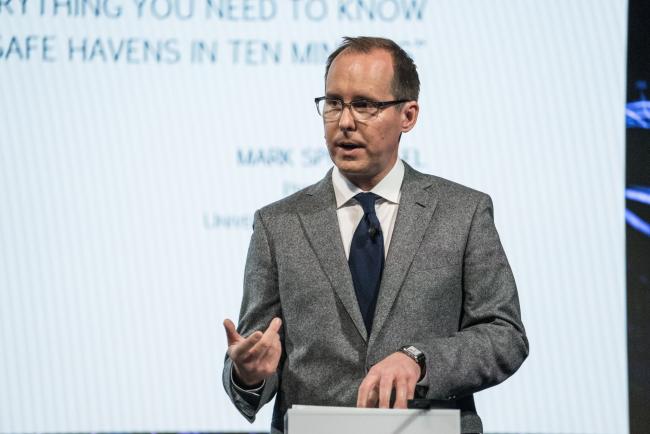(Bloomberg) -- Mark Spitznagel is paid to be prepared for when the market’s weakest links are exposed in a big way.
Right now, the Universa Investments founder, whose fund aims to protect clients during black swan events, says the financial system is most vulnerable to “the greatest credit bubble of human history.”
“If this credit bubble ever pops, it’s going to be the most catastrophic market failure that anyone has ever read about -- but let’s hope that doesn’t happen,” Spitznagel, Miami-based Universa’s chief investment officer, said Thursday in a telephone interview. “We’ve gotten ourselves into a tough spot.”
Spitznagel, 51, insists he’s not a “doom and gloomer.” He’s long been critical of central banks keeping interest rates near-zero or even negative, which he says has propped up asset values and encouraged excessive borrowing. Officials around the world are now tightening monetary policy to combat elevated inflation.
His warning follows other cautious remarks this week from JPMorgan Chase & Co. (NYSE:JPM) Chief Executive Officer Jamie Dimon, who told investors to prepare for an economic “hurricane,” and Goldman Sachs Group Inc (NYSE:GS). President John Waldron, who said he’s seen an unprecedented number of shocks and expects “tougher economic times ahead.”
Traditional flight-to-quality assets like US Treasuries and gold are failing investors this year, adding to the pain, Spitznagel said. In his 2021 book “Safe Haven,” he argued both were inconsistent at mitigating risks.
Universa, founded in 2007 and advised by Nassim Nicholas Taleb, is a hedge fund in the purest sense, specializing in risk mitigation. It aims to protect against the biggest market crashes by preserving capital over those periods. It told clients its options trades returned 3,612% in March 2020, according to a letter obtained by Bloomberg at the time.
At a time when hedge funds like Chase Coleman’s Tiger Global Management are caught in the middle of a rout in technology stocks, and Gabe Plotkin’s Melvin Capital Management is shuttering after a string of losses, Spitznagel reiterated his criticism of the industry at large.
“What purpose do hedge funds play in anyone’s portfolio? I’ve never been able to answer that question,” he said. “Hedge funds have created a solution for the wrong problem.”
Popular hedge fund strategies, such as risk parity and lowering volatility, do little to improve returns as they search for havens when markets go south, Spitznagel said. In fact, they may lose money over the long term.
“You’re making a market call,” he said. “To make your portfolio either more or less defensive today, that would be an extraordinary forecast to make today that we’re all going to get wrong.”
Those who tactically try to mitigate risk “are going to get churned and burned, that’s what the market does to people,” Spitznagel said.
©2022 Bloomberg L.P.
